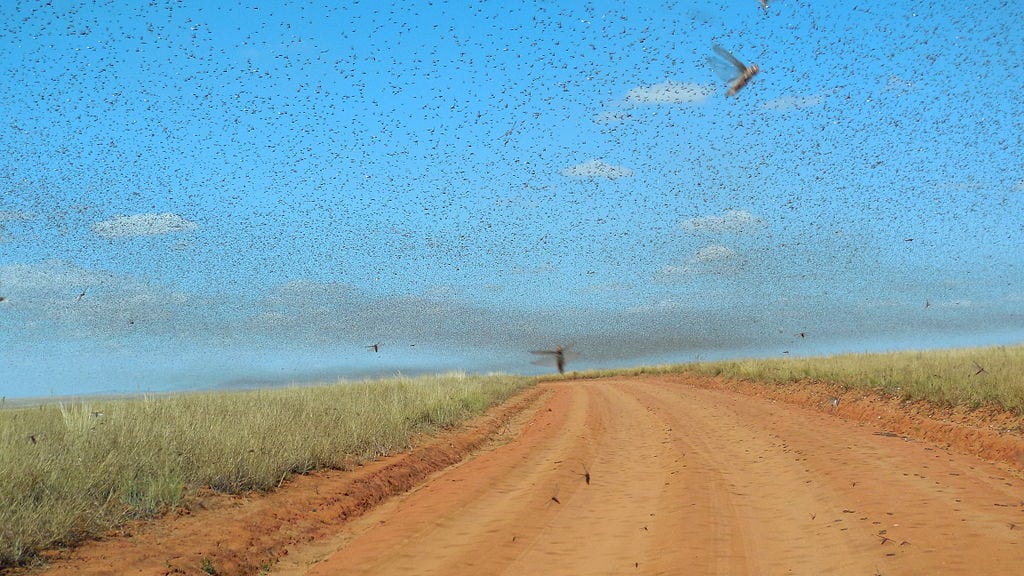This is a fresh post from Worldwise, a newsletter for global insight and journalism where current affairs meet humanity.
It’s written by Anita Makri. If you like what you’re reading, let me know by tapping the little heart button or spread the word by sharing the post.
Was this forwarded to you? Learn more and sign up here.

Photo by Iwoelbern on Wikimedia
The Worldwise View
Time for a little break from Covid-19.
This post is completely coronavirus-free. Which isn’t to say it makes jolly reading.
Here’s a selection of current pressure points outside the Western world which don’t make the front pages, but could have far-reaching ramifications in the regions where they’re unfolding, if not globally.
#1—A plague of locusts
Huge swarms of locusts have been invading Africa, the Middle East and South Asia over the past months.
The worst locust outbreak in decades, it started just before the new year in the Horn of Africa—I picked up the first report in mid-January, by which time thousands of hectares of farmland were destroyed in Somalia and Ethiopia.
It’s been relentless ever since, in what experts have called a “rolling emergency” that’s linked to changes in climatic conditions. Practically every single news roundup I’ve done this year had a report about locust swarms advancing.
And it continues (NBC + WEF + NPR). There’s a third wave in East Africa, with millions of insects landing on food-insecure regions in northern Kenya at a time when the country is also struggling with floods and the pandemic.
Crop disasters in the developing world tend to become front-page news when they reach the point of famine. Would it be any different if something similar was unfolding in the Global North?
Well: as it happens, Sardinia is seeing a larger outbreak of locusts than usual, with millions destroying more than 2000 hectares of farmland (Reuters + BBC).
Let’s hope it stops there, and we never get to answer my question.
#2—Trouble on the Nile
It’s a tense affair. Egypt, Ethiopia and Sudan have resumed talks in a last-ditch attempt to resolve a bitter dispute over a giant dam on the Nile, the world’s longest river.
The dispute over the Renaissance Dam has been brewing for years. And it could have serious consequences for the region—both in terms of water distribution and in terms of conflict.
To put it in simple terms: while Ethiopia sees the dam as a gateway to generating electricity and boosting its development, Egypt fears the water shortages it would cause for its territories downstream.
The threats are escalating, with Ethiopia asserting its right to move ahead with controversial plans to fill the dam and Egypt not shying away from talk of war if that goes ahead (Middle East Monitor + Yahoo/AFP + Axios).
These quotes from a piece in South Africa’s Mail & Guardian—a good explainer of what’s at stake and how it all got this point—get to the heart of it:
"For Egypt, the Nile is synonymous with life itself. [...] For millennia, it has enjoyed an almost entirely uninterrupted supply of Nile water. […] [S]oon, Ethiopia will have the power to turn Egypt’s taps on and off."—Samuel Getachew and Simon Allison
For more analysis, the Economist has two pieces worth a read—here and here.
#3—Tech as weapon in India-China clash
In mid-June, a deadly clash between Indian and Chinese forces in a disputed Himalayan border area was the first such incident in the area for at least 45 years.
Then followed this manoeuvre: India's government banned Tik-Tok and dozens more apps made in China, citing data security concerns. India is a huge market for social media, and the move is designed for political pressure.
The “app war” is a new and rather contemporary front to a conflict that’s also prompting India to cut down on economic ties with its neighbour.
It looks like a ticking time bomb for relations between two of the world’s most populous countries and fastest-growing large economies.

Photo by Kon Karampelas on Unsplash
In other news that caught my eye
Technology
IBM is moving away from facial recognition technology - Verge
Google is embarking on image fact-checking - Washington Post
Israeli spyware used to target a journalist through WhatsApp - Guardian
Brazilian fact-checkers say a proposed law on fake news through messaging apps is prone to abuse - Poynter
Environment & wildlife
Plastic is everywhere, and it's the new acid rain - Wired + NYT
E-waste has grown by about 20% in five years - Guardian
‘Alarming’ use of critical human antibiotics on crops - SciDev.Net
Coconut oil production threatens five times more species than palm oil - Conversation
Dust pollution linked to infant mortality in Sub-Saharan Africa - SCOPE
Land purchases by private companies accelerate tropical deforestation - Carbon Brief
Hundreds of elephants are mysteriously dying in Botswana - Conversation
The mining company Rio Tinto has legally detonated explosives at a sacred Aboriginal site in Western Australia to expand an iron ore mine - The Sydney Morning Herald
Climate change
Intense fires set a pollution record in the Arctic - NYT
Amazon rainforest-fire season starts with record burning predictions - Bloomberg
India wants to open new coal mines - Climate Home
Pakistan launches electric vehicle plan, but cars are left out in a last-minute change to the plan - Reuters
Drought in Lesotho takes villagers' land - Bloomberg
Used refrigerators and air conditioners imported from Europe, aka 'zombie appliances', are straining Africa's power supplies - Reuters
Fish are more vulnerable to global warming than we think - NYT/AP
A final note from the week’s soundtrack
Worldwise is written by Anita Makri. Was this email forwarded to you? Learn more and subscribe here.



